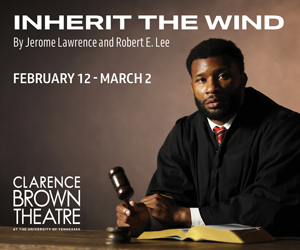By itself, neither rain, nor snow, nor sleet, nor sub-zero cold, is enough to keep dedicated music audiences from the object of their affection. But tie those forms of wintry weather together with hardened sheets of ice created by sleet frosted with a coating of snow as it was last weekend, and most usual concertgoers—as evidenced by the Thursday and Friday performances by the Knoxville Symphony Orchestra—chose to hunker down at home, unwilling to tempt fate on treacherous streets and slippery sidewalks. Well, almost everyone.
Even the KSO’s Friday night audience at the Tennessee Theatre, always the larger of the pair, was really no more than a smattering—although experts clearly disagree on what constitutes a smattering. Whatever the definition, the small-ish, but dedicated audience was nonetheless treated to a quality performance of Dvorák’s Stabat Mater that soothed a lot of ice-jangled nerves. Still, with the orchestra joined by the Knoxville Choral Society and the quartet of soloists, the numbers of musicians on stage were only barely fewer than the brave, dedicated souls in the audience.
Scholars have inferred that the recent death of his infant daughter pushed Antonin Dvorák to begin work on an expanded setting of the traditional Stabat Mater text in 1876. Before it was completed in 1877, though, Dvorák and his wife were dealt even more unimaginable sadness when both of their other infant children also died. No doubt spurred by grief, and choosing the solace of the text’s underpinning, the composer finished the work quickly. The first performance of the work took place in Prague three years later.
Drama and eloquent lyricism are hallmarks of this work, but what made hearing the KSO’s performance of Dvorák’s Stabat Mater so important for those in the audience was the fact that the work just isn’t heard that often. Its length of approximately 90 minutes places a burden on orchestras trying to fill out an evening. And, to be perfectly honest, some of the work’s beautiful and deeply enriching themes suffer from a bit too much repetition, repetition that often works against the gorgeous dramatic narrative, despite the magnetism of the orchestration.
Maestro Lucas Richman took a middle road in regards to tempi, neither rushing or dragging, allowing the text and the orchestral environment to carry the narrative, particularly with the evening’s soloists. For the most part, this worked admirably, but one almost longed for a bit more subtle variety in tempi and dynamics to strengthen moments of impact. However, Richman clearly understands the acoustics of the Tennessee Theatre and how to balance treble tones of strings and woodwinds—and their storytelling ability— against the gorgeous warm resonance of the hall.
Making a last minute substitution as the alto soloist was mezzo-soprano Jami Rhodes, standing in for the announced Lauren Lyles. Rhodes, an active performer in both operatic and concert milieus, is currently an Assistant Professor of Voice at East Carolina University. I found myself absolutely riveted by the effortless and smooth transition from her interestingly nuanced mid-range into a lower voice that was just as powerful—all this with beautiful articulation and diction. In the “Inflammatus et accensus,” one felt the text’s burning and consuming flames through her rich lows.
The other three soloists were making return appearances with the KSO. Bass Benjamin LeClair was heard in the April, 2011, performance of Beethoven’s Ninth Symphony. Soprano Natalee McReynolds has sung with the orchestra on several occasions in the last few years. Tenor Dustin Peterson, last heard here in the orchestra’s Candide, was particularly impressive for a gorgeously delivered tone that was backed up by power, projection, and clarity of diction.
While superb choral diction and a carefully honed balance have always been a feature of the Knoxville Choral Society, choral nimbleness and energetic freshness have not. Happily, though, this performance seems to indicate that is changing for this fine ensemble; I was greatly impressed by the clarity and vibrancy of their sound on this occasion, particularly in the sopranos, that only added to the expected good balance and projected diction.






